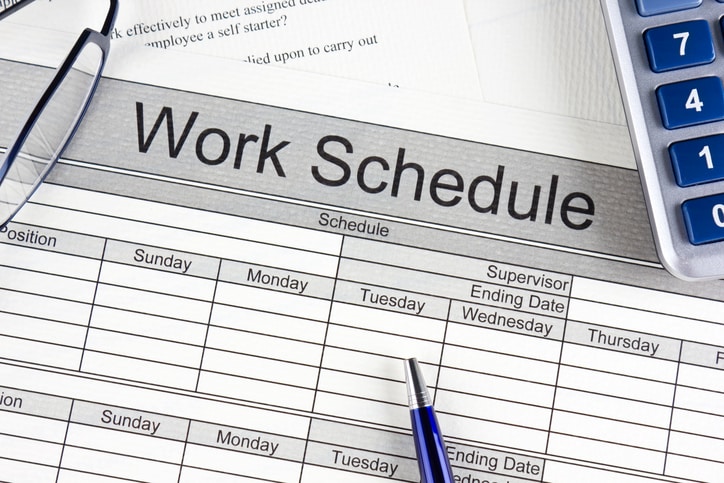Guide to Making an Effective Work Schedule
By Space Coast Daily // December 11, 2020

Creating an effective work schedule for employees is essential for the smooth running of any business unit that has a sizable number of workers. Expressed in simple terms, a work schedule outlines the days of the week employees are expected to work, the starting and finishing times and for businesses who operate 24 hrs a day the shift times.
A work schedule stands at the core of a business because it affects any business’s most important resource, its human capital.
Develop a Work Schedule
Preparing one can be rightly considered a delicate undertaking because it is essentially drafted and prepared by management but should at the same time be acceptable to employees.
There is little or no consultation between the two parties in the form it takes. It is recommended to develop a schedule maker for your business.
Management prepares it in line with, and to meet organizational goals and demands though workers should of course be aware of the hours of work expected of them from the time they applied for a position during the job interview and at the time they are deployed. We here offer some tips on preparing an effective work schedule for different organizations.
Give Ample Notice
As a manager preparing a work schedule for your team, always remember it is a document meant for other human beings. Prepare and distribute it as far in advance as is practical.
In this digital age, this can be done using a cloud-based app or email. If workers get it in time they can make any necessary adjustments in their personal lives.
Also, make sure every employee has received a copy and gives you feedback acknowledging this fact. This allows for enough time in case there are queries or someone requests swapping shifts with a colleague.
Allow Reasonable Flexibility
As said earlier, an employee is a human being not a robot. So they should have the opportunity to be heard when the circumstances warrant it.
For example, in a department where there is shift work and the number of employees is not too large and the work is fairly routine, it could be a good idea to have the workers discuss amongst themselves first choosing their preferred shift and who they want to partner in those shifts rather than impose.
It’s a great motivational tactic. Also, if two workers come forward requesting a swap, accommodate them as long as competence is not compromised.
In anticipation of such requests, it helps to have a scheduling tool that aids or helps to match shift trades with skill sets to prevent the possibility of an employee ending up performing duties they are not competent in.
Anticipate and Plan Accordingly
In the entertainment industry, for example, the volume of business fluctuates seasonally, weekly or even daily or hourly. A hotel might need three chefs and six waiters mid-week but double that number on weekends and three times that number during the festive season.
A good schedule maker anticipates all this and factors it all in. You could even use an easy and free online schedule maker to make your planning easier.
Make it Predictable
Yes, make your work schedule as predictable as possible. Giving your employees highly irregular and seemingly haphazard times to report for work is going to cause inconveniences and disorder in their own personal lives and demotivate them.
Minimize Scheduling Conflicts
Whilst the work schedule should be as consistent as possible, there is something that must always be borne in mind where rotation of duties is concerned. Consider the case of a large hotel that employs a large number of cleaning staff.
Some sections of the complex are always going to be considered (by employees) to be more unpleasant to clean than others, for example, kitchens and toilets. It might be a good idea to schedule duties so that everyone has a stint in these work areas to prevent charges and complaints of favoritism which affect morale. These are causes of conflict which are easily prevented.
Make it Error Free
A work schedule that contains errors can cause unnecessary inconveniences like work disruptions. A common cause of errors that crop up in work schedules is that people rush through the preparation. So take great care during the process.
Another common error is that an employee is scheduled for the wrong position. In a garage for example it does not necessarily mean that someone who is good at mending tires is also good at cleaning them. Such shoddy scheduling also results in shoddy work.
A common error is double scheduling a worker. A bar might have a worker who sometimes works as a bartender and sometimes as a bouncer/doorman. Make sure such employees are not scheduled twice during the same shift.












